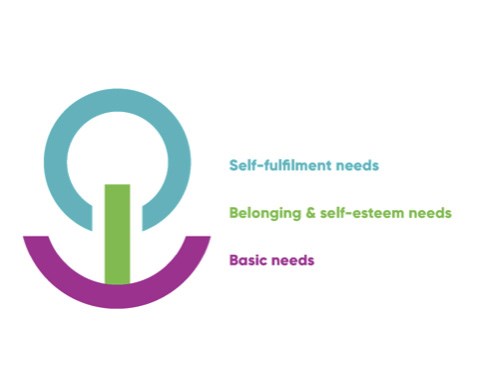Reset
Edinburgh Community Resilience Programme (Reset)
Reset is an intersectoral partnership designed to support health and wellbeing of older people in the city of Edinburgh through increasing community resilience. This vibrant, innovative new programme seeks to tackle “what matters most” to people, enabling more people, and the people who support them, to have “more good days” Irvine-Fitzpatrick 2021, Edinburgh Wellbeing Pact Report. Our aim is to develop and optimise an evidence based, resilience focussed model of community support through mixed methods Participatory Action Research (PAR).

The Reset model has been developed based on existing expertise and research evidence, generated by the project partners, and includes the resilience framework (Queen Margaret University) [include links to Whitehall et al., 2021 & Gorska et al., 2021] and community navigation / social prescribing approach to community support (Cyrenians) [include links to Lesniewska 2021, Community Navigator report & link to Cyrenians Reset webpage.
- About Us
- Background
- Research
- Phase 1
- Phase 2
What we aim to do
Our aim is to meet the Edinburgh Wellbeing Pact’s ambition to maximise the wellbeing of Edinburgh’s older people through resilience, connections and commitment to what is important to individuals [include link to Edinburgh Wellbeing Pact report, Irvine Fitzpatrick 2021]. We will use mixed methods PAR to tailor the Reset model to the needs of older people living in Edinburgh communities.
The Reset Partnership Team
- Strategic lead: Dr Linda Irvine Fitzpatrick (Edinburgh Wellbeing Pact and Community Mobilisation)
- Practice lead: Sylvia Lesniewska (Cyrenians)
- Academic lead: Dr Sylwia Gorska (Queen Margaret University Edinburgh)
- Community support team: Heather MacDonald (NW Locality); Nicky Gaff (SE Locality) (Cyrenians)
- Research assistant: Dr Lindsay Horton (Queen Margaret University Edinburgh)
Programme Oversight Group
The overall research process and strategy will be governed by a Programme Oversight Group, inclusive of members of the Reset partnership team and professional stakeholders identified as having strategic and operational roles in the delivery of health and social care for older adults in Edinburgh communities.
Research Advisory Group
The Research Advisory Group will include representatives from the local community, including older people living in the city and those identified as having interest and expertise in providing community support to older people in the city. This group will be consulted to help shape the research and the resilience focussed model of community support.
Project Timeframe
Funding is secured until 31 March 2025.
The Impact
Our research will generate new information on the resilience needs of older adults living in Edinburgh communities. Our findings and recommendations will influence policies affecting service provision for older people in the local context. Our research may also inform policy makers nationally and internationally, regarding the feasibility of developing resilience focussed community support services in different contexts.
What is resilience?
Resilience has been defined by Windle (2011) as ‘the process of effectively negotiating, adapting to, or managing sources of stress or trauma’.
Researchers at QMU have developed a resilience framework in partnership with NHS Lothian, a range of third sector partners, and older people in Edinburgh Whitehall et al. 2021, Gorska et al., 2021. The framework can be used to facilitate person-centred conversations about older peoples’ resilience and recognises that:
- resilience can change over a person’s lifespan (i.e., it is a dynamic construct),
- resilience is influenced by a range of personal and environmental factors (i.e., it is a multi-dimensional construct).
The resilience framework includes a questionnaire made up of 34 items which capture older adults’ perceived resilience. The questions reflect the needs all humans have, including basic needs, such as health and wellbeing, access to resources, safety and comfort (the roots); the need for belonging and self-esteem (the tree trunk); and the need for self-fulfilment (the tree crown)
Figure 2: Reset tree icon

We will use the resilience framework research to:
- find out how older people feel about their resilience,
- identify the needs and assets that are most important to older people accessing the Reset model of support,
- facilitate outcome measurement.
What is the community navigator / social prescribing approach?
Social prescribing involves linking people with non-medical assets and resources in their community. It is advocated by policy makers nationally and internationally.
A community navigator/ social prescribing approach was piloted by Cyrenians in North East Edinburgh from 2019 to 2020 [insert link to Community Navigator report]. This pilot project used social prescribing and collaborative intersectoral working to help older people with long term conditions, who were facing multiple socioeconomic barriers, to navigate sources of non-clinical support and strengthen their links with people around them.
We will evaluate, through qualitative methods, how best to use the community navigator approach to:
- harness non-statutory community assets,
- build capacity,
- support sustainability of public services,
- support older people’s health and wellbeing through increasing their community resilience.
What is the Incite model?
We will use the Incite model of intersectoral partnership to guide our research process Irvine Fitzpatrick et al., 2021. The ‘Incite’ model identifies the mechanisms and spaces characterising successful collaboration between agencies located within different sectors (e.g., statutory sector, third sector). It also highlights the importance of sharing perspectives, skills, and resources across different sectors to encourage innovative, creative, holistic, and nuanced responses to people’s needs.
Why we choose participatory action research (PAR)
We chose PAR because we want to do research ‘with’ people rather than ‘on’ them. PAR actively involves people in making decisions about the issues that affect them and involves stakeholders in implementing and evaluating change. PAR has been previously identified as an effective strategy for developing, optimising, testing and sustaining health and social care programmes, making it a suitable approach for our research.
What we want to find out
We will use mixed methods PAR to address the following research questions:
- RQ1: What needs does the resilience focussed model of community support respond to?
- RQ2: What are the barriers and opportunities related to the resilience focussed model of community support?
- RQ3: What qualities in the workforce are important to older people receiving resilience focused model of community support?
- RQ4: What is the optimal way of using the resilience framework within the model of community support?
Participants will include:
- older people who receive support from Reset
- older people living in Edinburgh communities who may not benefit directly from Reset support
- Reset partnership team members
- A range of stakeholders with experience and expertise working with and supporting older people within their communities
Our research process and strategy
Our research includes at least two PAR learning cycles, guided by the ‘Incite’ model (Irvine Fitzpatrick et al., 2021).
We will use Qualitative methods, including individual interviews, focus groups, and observation, to explore people’s experiences of, and perspectives on, the Reset model. We will also invite people to get involved in analysing and interpreting research findings to ensure that the optimised Reset model reflects the needs of older people living in Edinburgh communities.
We will use Quantitative methods to gather demographic information about older people receiving support from the Reset team. We will also use the resilience questionnaire to profile the community resilience needs of people accessing this type of support.
What we did
PAR Cycle 1 addresses research questions 1, 2 and 3. We will carry out a series of research activities to:
- identify which needs the Reset model of community support responds to (qualitative and quantitative methods)
- Identify the barriers and opportunities related to the model (qualitative methods)
- Identify which qualities in the workforce are important to older people receiving this type of support (qualitative methods)
What we found
To be completed…
What’s next
To be completed…
What we did
PAR Cycle 2 will address key learning points from Cycle 1 to answer research question 4 (what is the optimal way of using the resilience framework within the model of community support?).
What we found
To be completed…
What’s next
To be completed….
Contact Us
Dr Sylwia Górska, Occupational Therapy and Arts Therapy, Queen Margaret University,
Dr Lindsay Horton, Occupational Therapy and Arts Therapy, Queen Margaret University.



